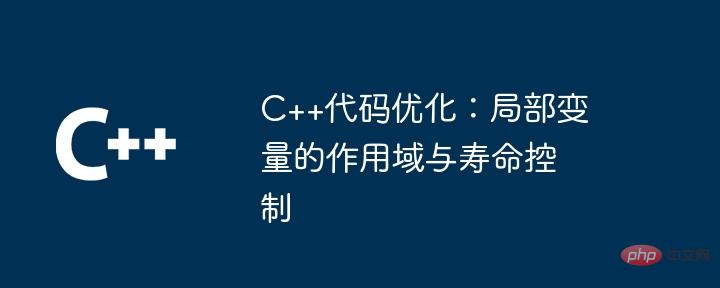Home >Backend Development >C++ >C++ code optimization: scope and lifetime control of local variables
C++ code optimization: scope and lifetime control of local variables
- WBOYWBOYWBOYWBOYWBOYWBOYWBOYWBOYWBOYWBOYWBOYWBOYWBOriginal
- 2024-06-02 14:24:151197browse
Local variable optimization: Control scope: Limit the scope of local variables and use them only when needed to avoid unnecessary memory usage. Shorten the lifetime: Use block scoping and RAII to shorten the lifetime of local variables and free the memory when it is no longer needed. Avoid unnecessary copies and moves: Use references or pointers to pass local variables to save running time and memory consumption. Use constants: Declare immutable local variables as const to improve compiler optimization capabilities.

C++ Code Optimization: Scope and Lifetime Control of Local Variables
The scope and lifecycle of variables are important for optimizing C++ code Crucial. Understanding these aspects of local variables can improve the performance and efficiency of your code.
Scope
The scope of a local variable refers to which parts of the code it can be accessed. In C++, the scope of a local variable begins at the point where it is declared and ends at the end of the block of code in which it is contained.
For example:
void function() {
int a; // 局部变量的作用域从这里开始
std::cout << a << std::endl; // 可以访问局部变量 'a'
{
int b; // 嵌套作用域中的局部变量
std::cout << b << std::endl; // 可以访问局部变量 'b'
}
// 不能访问嵌套作用域中的局部变量 'b'
}Lifetime
The lifespan of a local variable refers to the time it exists in memory. In C++, the life of a local variable begins when it is defined and ends when the block of code in which it exists exits.
For example:
void function() {
{
int a; // 局部变量 'a' 的寿命从这里开始
std::cout << a << std::endl; // 可以访问 'a'
} // 局部变量 'a' 的寿命在此处结束,不再可以访问
{
int b; // 新的局部变量 'b' 的寿命从这里开始
std::cout << b << std::endl; // 可以访问 'b'
} // 局部变量 'b' 的寿命在此处结束,不再可以访问
}Optimization
C++ code can be optimized by controlling the scope and lifetime of local variables:
- Reduce scope: Limit the scope of local variables to only use them where needed to avoid unnecessary memory usage.
- Reduce lifespan: Shorten the lifespan of local variables so that they can release memory immediately when they are no longer needed. This can be achieved by using techniques such as block scoping and RAII (Resource Acquisition i.e. Initialization).
- Avoid unnecessary copying and moving: By using references or pointers to pass local variables, avoid unnecessary copying and moving operations on them, saving running time and memory consumption.
- Use constants: Declare immutable local variables as const to improve compiler optimization capabilities.
Practical case
In the following code, buffer is declared as a local variable, which will cause unnecessary memory overhead and Performance degradation:
void function(int size) {
int *buffer = new int[size]; // 局部变量,可能浪费大量内存
for (int i = 0; i < size; i++) {
buffer[i] = i;
}
delete[] buffer; // 记得释放内存
}The code can be optimized by declaring buffer as a parameter of the function and using smart pointers to manage the memory:
void function(int size) {
std::unique_ptr<int[]> buffer(new int[size]); // 智能指针管理内存
for (int i = 0; i < size; i++) {
buffer[i] = i;
}
} // 内存自动释放,无需显式调用 delete[]The above is the detailed content of C++ code optimization: scope and lifetime control of local variables. For more information, please follow other related articles on the PHP Chinese website!

